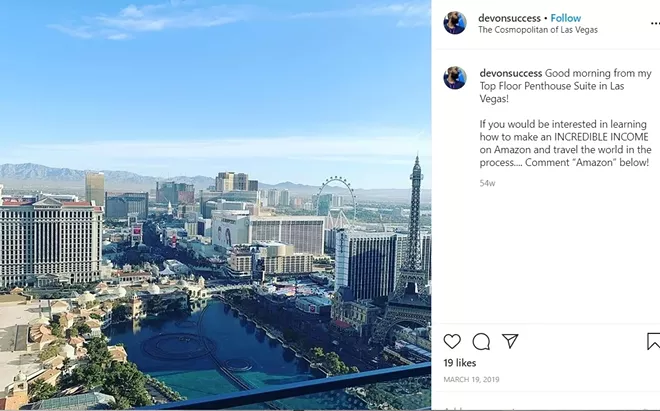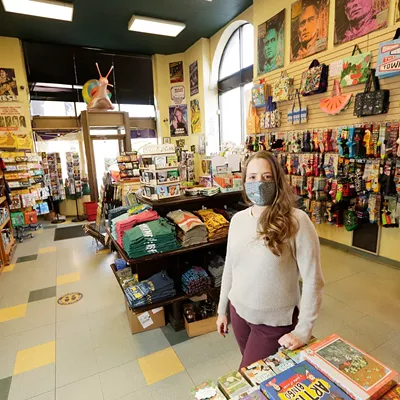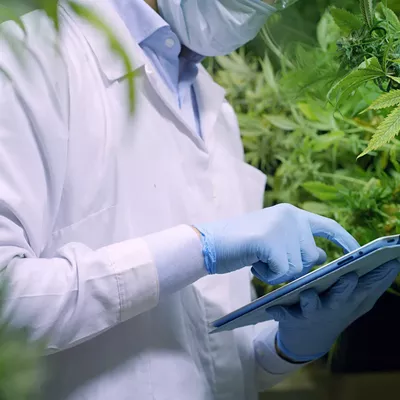The Washington Cleaning Supply website — before it was removed — looked like the website of a cleaning supplier from Washington. It was crisp and clean, with a simple but professional logo.
"Healthful," it said over the image of a woman in a medical mask."Reliable," it said over an image of hands being cleaned in the sink.
"Responsible," it said below the Washington Cleaning Supply logo against the backdrop of a snowy mountain.
But any janitor worth his weight in Windex might quickly notice a few suspicious details: For one, there was the grammatical error on the "Best Seller's" tab. And then there was the fact that Washington Cleaning Supply doesn't appear to supply some of the most basic cleaning equipment: No Pinesol, no squeegees, no mops, towels, power washers, garbage bags or foaming degreasers.
In fact, Washington Cleaning Supply only sold three types of products: N95 masks, hand sanitizer and disinfectant wipes.
On March 15, for example, the site appeared to be offering what looked like a screaming deal for a 20-pack of N95-plus 8210 Particulate Respirator masks. Normally, Washington Cleaning Supply suggests, the 20-pack of masks sell for $149. But, right then, Washington Cleaning Supply was willing to let it go for the rock-bottom sale price of $79.99.
By contrast, a retailer like Eio.com typically sells the exact same product for $22.50. Hell, Walmart generally sells a similar product for only $16.66. (Both are currently out of stock.)
In the early days of the coronavirus crisis, local Spokane County leaders began to worry about price gouging by opportunists who were buying bulk amounts of important supplies so they could sell them back to those who needed them at a steep profit.
"I have had some discussion with some of the electeds about having the AG crack down on this," says Spokane County Sheriff Ozzie Knezovich. "I find it fairly appalling that people are willing to take advantage of their neighbors during this."
Knezovich was particularly disturbed by people trying to make money by selling personal protective equipment masks.
"I was like, 'Really, you’re going to try to make money off of that?'" Knezovich says. "That one that speaks to a different level of low."
Inspect the web coding behind Washington Cleaning Supply and you'll see that it's actually just a facade for "Cozy Comfortable," a storefront on the Internet retailer service Shopify. In fact, the Washington Cleaning Supply web domain didn't even exist before March 7.
Until they started dabbling in personal protective equipment in March, they mostly sold an eclectic mix of products like T-shirts, beard-shaping tools, luxury electroplating and a giant "fluffy iPhone fur case."
The owners of Cozy Comfortable and Washington Cleaning Supply aren't identified. But the email address on the refund page — stayhumblenow@gmail.com — is the same email Eastern Washington University alum Devon Mahdi used on his personal website.
"In this time of uncertainty, consumers should not have to worry about being charged excessive prices for goods they need to stay healthy," Ferguson wrote. "My office will hold sellers accountable for price gouging during this emergency."

A year before Ferguson accused him of price gouging, Mahdi was on — if not the top of the world — at least the top of Las Vegas. He shared an Instagram picture purporting to be from the "Top Floor Penthouse Suite in Las Vegas."
That March, he hosted what he promoted on his "stayhumblenow.clickfunnels.com" page as "THE ULTIMATE HUSTLER CONFERENCE 2019."
Four other masters of e-commerce, he claimed, would be at the conference at Vegas's Delano hotel too, and stressed the ticket price had been slashed from $995 to only $495.
And his business address, the AG wrote, was located in Spokane.
Instead, Mahdi began to delete pieces of his social media presence, including his Ultimate Hustler Conference advertisement and posts touting how much money he was making on Amazon.
When we called the number associated with Mahdi's business address, however, we did reach a man who identified himself as Mahdi's stepdad.
He said he didn't have Mahdi's phone number, but generally communicated with him on Facebook.
Devon Mahdi wasn't the only Spokane-affiliated entrepreneur who saw a business opportunity as the coronavirus began to spread.
"I had 30,000 facemasks on order myself," says Scott Cook, owner of Lucky Bird Brands, an e-commerce company in Spokane. Cook is the former director of business development for etailz, one of Spokane's biggest e-commerce success stories.
Working with overseas suppliers for the company's private-label RinCon Outdoor hammock line, he says he began to hear rumblings from Asia late last year.
Cook quickly began to see activity with one type of product in particular: N95 face masks.
But as the coronavirus began to spread throughout China, he saw competitors begin to spring up, some hocking phony products with less protection than they claimed.
He found a supplier. He certified that they'd be able to make N95-quality masks. The masks wouldn't just be kid-sized, they'd have fun kid designs on them, like cars and trucks and princesses. (Not Disney princesses, to be clear — that would just be begging for a trademark lawsuit.)
Cook planned to sell 3-packs of the masks an Amazon for a max of $14.99. Once he accounted for shipping costs and Amazon's commission, that would net him about a $1.50 profit per package. Was that price gouging? Not in comparison, he argues.
"[Some sites] were selling a single mask for $19.99," Cook says. He called the new business line "Munchkin Masks" and built an early version of a website for the product.
But by March 5, Cook's plan was dead.
Amazon was cracking down on everyone selling masks at a big markup. To test the system, he put up an early listing, before he even had the product in hand: Sure enough Amazon flagged Cook's masks, booted the Munchkin Masks from the store, and wouldn't let him back in.
(Today, an etailz spokeswoman tells the Inlander that they have caps on their prices to ensure that sort of thing doesn't happen again.)
But this time, Amazon went further.
"Amazon was straight-up killing every listing that had the word mask in it," Cook says. "Women's [makeup] face-mask listings were going down, too."
Predicting he quickly wouldn't have a place to sell his product, Cook canceled his order.
But it wasn't just Amazon cracking down on those trying to make money off of coronavirus products.
Every big e-commerce platform followed suit, one by one cracking down on the same masks and sanitizer.

T
he e-commerce world, Cook says, is filled with hustlers.
"If there is a way to make a dollar, even if it’s an unconventional means, and you're willing to do it, I would call you a hustler," Cook says. "I’m like a 'reformed hustler.' The reformed hustler thinks about things long-term and cares for people."
"Hustler," of course, can be a synonym for "scam artist," but here it's used as a compliment for marketers who never stop working, who see the business opportunities everywhere.
On websites, YouTube videos and podcasts, Modhi often stresses his hardscrabble low-income foster care upbringing, his first job working at Walmart, and two of his high school friends being murdered.
"How to make money using Google," he writes in another.
A few years ago, Mahdi discovered "online arbitrage."
Say somebody's selling a popular product for $50 on Amazon: You offer to sell that same product for $65 on eBay. And so if someone purchases it from eBay, all you do is have Amazon ship it directly to the customer, and then you're able to pocket most of the difference.
Mahdi describes using a "wizard fast" gaming PC that allows him to "evaluate data quickly and efficiently," which puts the price of popular products into an e-commerce app called RevSeller.
"I'll find a product and it's $15. It sells for $35," Mahdi said. "I put it in RevSeller. RevSeller says I'm making $5 bucks. Boom, I buy it. Boom, it's done."
Back in 2018, Mahdi said that his private label product had been taken down because of a safety complaint. He's sometimes been hit with trademark or IP complaints from companies unhappy he's reselling their products. But that, he recognized, was the cost of doing business.
You'd think with most retail stores closed, this would be a booming time for e-commerce businesses. It is, but for Amazon.
The smaller businesses, particularly the e-commerce middlemen, often relied on Amazon's "Fulfilled By Amazon" distribution to be profitable. But Amazon has shut down that system almost entirely in order to give priority to essential goods like groceries and medical supplies. Selling hammocks — or almost anything — made overseas suddenly became a lot harder.
"They're riding under a guise of being a savior," Cook says. "My suspicion is that it's more of a land grab to grab the grocery market permanently away from brick-and-mortar grocery stores.
"One of my factories sent me a picture," Cook says. "It's a picture of their factory [in China,] and the double doors are literally welded shut."
Steven Peterson, host of the eCommerce Momentum podcast, lamented on last week's episode that his company's "sales on Amazon are down 75 percent."
Cook, for his part, hasn't entirely given up on his Munchkin Mask idea. But he also wants to make sure that e-commerce companies have a positive, ethical role to play in this crisis, not just looking for money-making opportunities.
Cook says he's working with a supplier to get 1,000 single-barrier cotton masks — not an N95 mask, but better than nothing — to hand them out for free. He's giving some local restaurants and retailers free consultations as they try to make set up websites to sell online.
And the more unethical hustlers? They find a way, too.
Thursday night, Cook emailed over an Amazon listing selling a single "N9-5 Anti-air Pollution face m-a-s-k with Respirator" for $10.99. By Friday afternoon the price had already increased to $12.90.
It wasn't even a real N95 mask, Cook says.
"This seller figured out to game Amazon's algorithms by hiding words that he/she knew would get flagged by Amazon," Cook wrote in an email. "Punk. My data shows me they sold 400+ units in the last 48 hours. This is NOT an N95 mask. Those sleeves are garbage and do not form fit to your face."



























